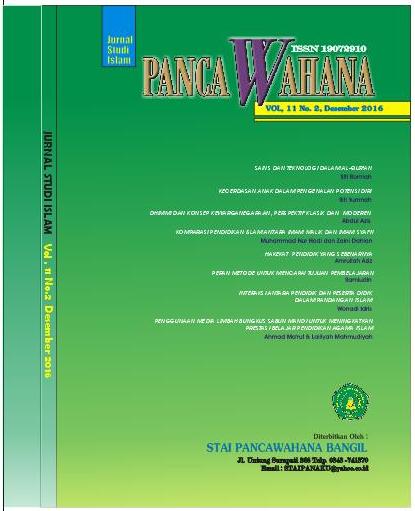DHIMMI DAN KONSEP KEWARGANEGARAAN, PERSPEKTIF KLASIK DAN MODERN
Keywords:
Dhimmi, citizenship
Abstract
In the concept of citizenship of the Classical Islamic country, dhimmi is a non-muslim citizen in practice life state gets preferential treatment which are not the same, and the different treatment is based because of religious differences. This contrasts with the modern country that gives equal treatment to all citizens without differentiating religion. Background to the emergence of the concept of citizenship in the classical Islamic State is a situation of conflict, namely the gelobal war between Islam and non-Muslims, and in Islamic countries, the most important principle is the similarity of belief and submission of non-Muslims by Muslim countries through the Akkadian dhimmah. This contrasts with the modern State, based on the recognition of the principle of ius soli through legitimate (place of birth) and ius sanguinis (descendant) and secular in nature, i.e. the awareness of the human equation, without distinguishing the tribe, race, colour or religion.References
'Atiyyah, Jamal al-Din Muhammad. Fiqh Baru Bagi Kaum Minoritas. Penerj. Sofiyullah. Bandung: Marja, 2006.
al-'Arabi, Ibn. Ahkam al-Qur'an, Juz 2. Libanon: Dar al-Ma'rifah, tt.
Harsono. Hukum Tata Negara, Perkembangan Pengaturan Kewarganegaraan. Yogyakarta: Liberty 1992.
al-Huwaydi, Fahmi. Muwat}inun La Dhimmiyyun. Beirut: Dar al-Shuruq, 1990.
Hourani, Albert. Sejarah Bangsa-bangsa Muslim. Penerj. Irfan Abu Bakr. Bandung: PT Mizan Pustaka, 2004.
Kaddhuri, Majid. Perang dan Damai Dalam Islam, Penerj. Sjaukat Djajadiningrat. Jakarta: Usaha Penerbit Djaja Sakti, 1961.
al-Kasani, Abu Bakr Ibn Mas'ud. Badai' al-Sanai'. Beirut: al-Maktabah al-Shamlah, tt
al-Mawardi, Abi Hasan 'Ali Ibn Muhammad. al-Ahkam al-Sultaniyah. Beirut: Dar al-Fikr, tt.
al-Mawdudi, Abu A’la. Hukum dan Konstitusi: Sistem Politik Islam. Penerj. Asep Hikmat. Bandung: Mizan, 1995.
Minhaji, Akhmad, "Hak-Hak Asasi Manusia dalam Hukum Islam: Penafsiran Baru tentang Posisi Minoritas Non-Muslim," 'Ulum al-Qur'an 2, 1993.
al-Na'im, Abdullah Ah}mad. Dekonstruksi Syariah: Wacana Kebebasan Sipil, Hak Asasi Manusia dan Hubungan Internasional Dalam Islam.Penerj. Ahmad Suaedy dan Amiruddin al-Rany. Yogyakarta: LkiS, 2001.
Nasution, Harun dan Bakhtiar Effendi. Hak Asasi Manusia dalam Islam. Jakarta: Pustaka Firdaus, 1987.
al-Qard}awi,. Minoritas Non Muslim dalam Masyarakat Islam. Penerj. Muhammad Baqir. Bandung: Penerbit Karisma, 1994.
al-Razi, Fakhr al-Din Muhammad Ibn 'Umar. al-Tafsir al-Kabir, juz 7. Beirut: Dar al-Kutub al-'Ilmiyyah,tt.
Rosyada, Dede at all. Pendidikan kewarganegaraan (civic Education): Demokrasi, Hak Asasi Manusia dan Masyarakat Madani. Jakarta: ICCE UIN Syarif Hidayatullah Jakarta, 2000.
al-Shafi'i, Muhammad Ibn Idris. al-'Umm, vol 7. Beirut: Dar al-Fikr, 1990.
al-Sarakhasi, Shams al-Din. al-Mabsut, juz 12. Beirut: al-Maktabah al-Shamlah, tt.
Soetoprawiro, Koernaiatmanto. Hukum Kewarganegaraan dan Keimigrasian Indonesia. Jakarta: Gramedia, 1996.
Tutik, Titik Triwulan. Pokok-pokok Hukum Tata Negara, Jakarta: Prestasi Pustaka, 2006.
Yamin, Muhammad. Proklamasi dan Konstitusi Republik Indonesia. Jakarta: Ghalia Indonesia, 1982.
al-Zamakhshari, Mahmud Ibn 'Umar Ibn Ahmad. al-Kashaf, vol 1. Beirut: Dar al-Fikr, tt.
al-'Arabi, Ibn. Ahkam al-Qur'an, Juz 2. Libanon: Dar al-Ma'rifah, tt.
Harsono. Hukum Tata Negara, Perkembangan Pengaturan Kewarganegaraan. Yogyakarta: Liberty 1992.
al-Huwaydi, Fahmi. Muwat}inun La Dhimmiyyun. Beirut: Dar al-Shuruq, 1990.
Hourani, Albert. Sejarah Bangsa-bangsa Muslim. Penerj. Irfan Abu Bakr. Bandung: PT Mizan Pustaka, 2004.
Kaddhuri, Majid. Perang dan Damai Dalam Islam, Penerj. Sjaukat Djajadiningrat. Jakarta: Usaha Penerbit Djaja Sakti, 1961.
al-Kasani, Abu Bakr Ibn Mas'ud. Badai' al-Sanai'. Beirut: al-Maktabah al-Shamlah, tt
al-Mawardi, Abi Hasan 'Ali Ibn Muhammad. al-Ahkam al-Sultaniyah. Beirut: Dar al-Fikr, tt.
al-Mawdudi, Abu A’la. Hukum dan Konstitusi: Sistem Politik Islam. Penerj. Asep Hikmat. Bandung: Mizan, 1995.
Minhaji, Akhmad, "Hak-Hak Asasi Manusia dalam Hukum Islam: Penafsiran Baru tentang Posisi Minoritas Non-Muslim," 'Ulum al-Qur'an 2, 1993.
al-Na'im, Abdullah Ah}mad. Dekonstruksi Syariah: Wacana Kebebasan Sipil, Hak Asasi Manusia dan Hubungan Internasional Dalam Islam.Penerj. Ahmad Suaedy dan Amiruddin al-Rany. Yogyakarta: LkiS, 2001.
Nasution, Harun dan Bakhtiar Effendi. Hak Asasi Manusia dalam Islam. Jakarta: Pustaka Firdaus, 1987.
al-Qard}awi,. Minoritas Non Muslim dalam Masyarakat Islam. Penerj. Muhammad Baqir. Bandung: Penerbit Karisma, 1994.
al-Razi, Fakhr al-Din Muhammad Ibn 'Umar. al-Tafsir al-Kabir, juz 7. Beirut: Dar al-Kutub al-'Ilmiyyah,tt.
Rosyada, Dede at all. Pendidikan kewarganegaraan (civic Education): Demokrasi, Hak Asasi Manusia dan Masyarakat Madani. Jakarta: ICCE UIN Syarif Hidayatullah Jakarta, 2000.
al-Shafi'i, Muhammad Ibn Idris. al-'Umm, vol 7. Beirut: Dar al-Fikr, 1990.
al-Sarakhasi, Shams al-Din. al-Mabsut, juz 12. Beirut: al-Maktabah al-Shamlah, tt.
Soetoprawiro, Koernaiatmanto. Hukum Kewarganegaraan dan Keimigrasian Indonesia. Jakarta: Gramedia, 1996.
Tutik, Titik Triwulan. Pokok-pokok Hukum Tata Negara, Jakarta: Prestasi Pustaka, 2006.
Yamin, Muhammad. Proklamasi dan Konstitusi Republik Indonesia. Jakarta: Ghalia Indonesia, 1982.
al-Zamakhshari, Mahmud Ibn 'Umar Ibn Ahmad. al-Kashaf, vol 1. Beirut: Dar al-Fikr, tt.
Published
2016-12-01
Section
Articles
Hak Cipta
Jurnal Studi Islam Panca Wahana ini bisa digunakan bagi akademis dan juga khalayak luas.




